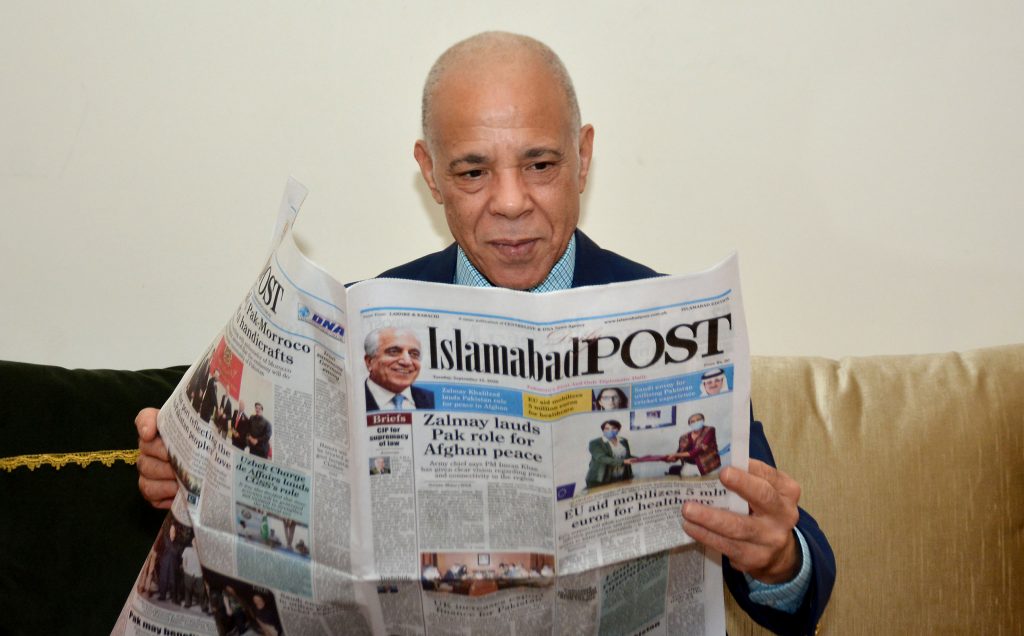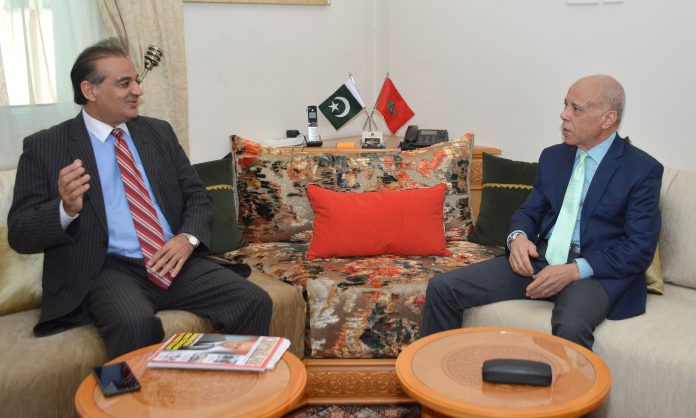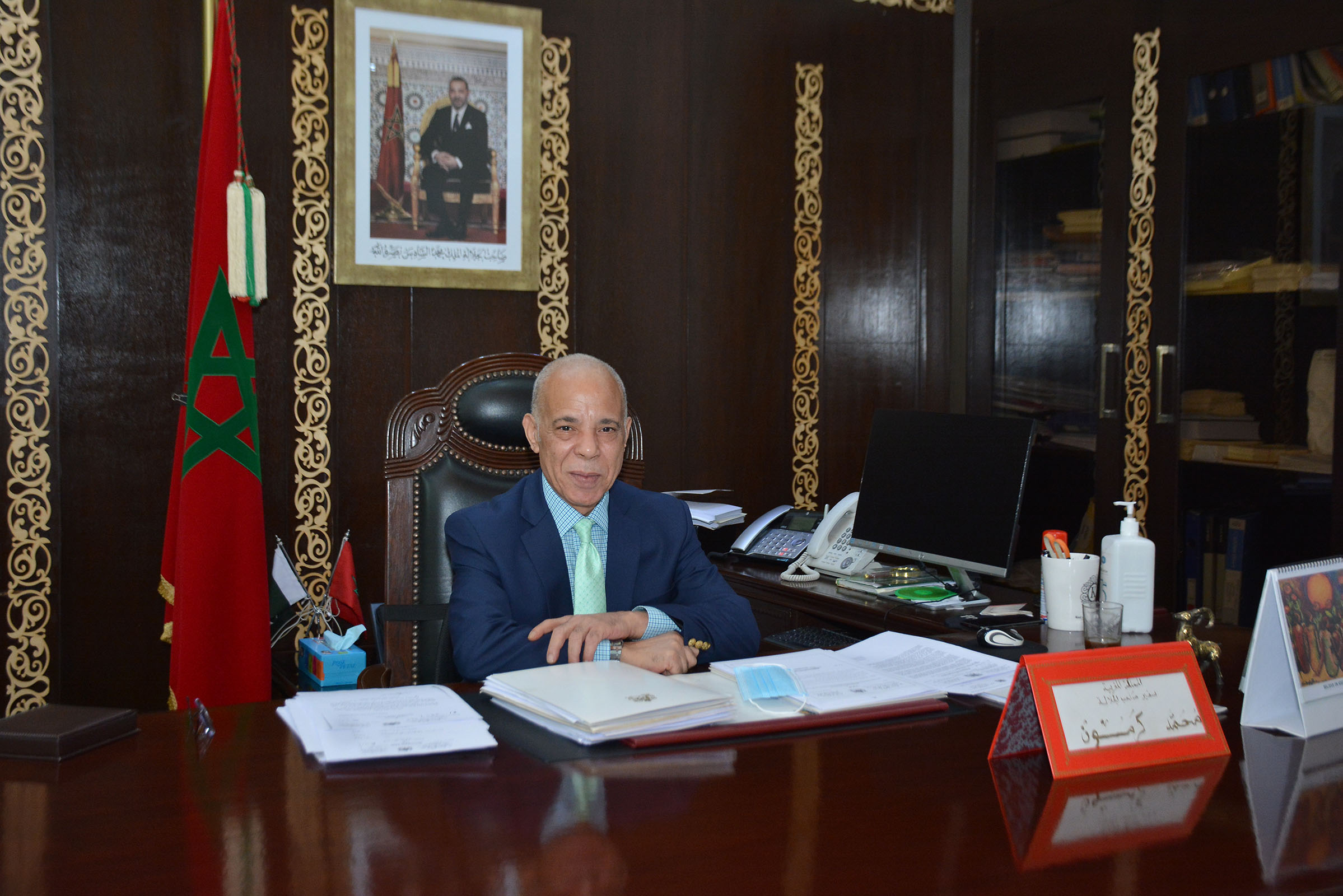Ambassador of Morocco to Pakistan Mohammed Karmoune gave an exclusive interview to Daily Islamabad POST, CENTRELINE magazine and DNA News Agency. The ambassador spoke about bilateral relations as well as various aspects of Moroccan economy, trade and culture. He also talked about his country’s efforts to deal with coronavirus. Here are excerpts from his interview.
EXCLUSIVE
Ansar Mahmood Bhatti
A country of excellence in an exceptional circumstance
In March, Morocco’s strategy of containing the spread of Coronavirus was praised by certain European political figures and media outlets. During his statement before the National Assembly in Paris, French leftist politician Jean Luc Melenchon considered Morocco’s response as inspirational; and said “Morocco has performed well in its plan to combat Covid-19 by commandeering its textile industry to make protective masks. France should be inspired by it.” In neighboring Spain, the president of the Foreign Affairs Committee in the Senate, Antonio Gutierrez Limones, described the Moroccan response as efficient and effective;
Italian News Agency NOVA also praised Morocco’s plan of dealing with the Coronavirus threat as “unprecedented and the first of its kind in Africa”.
On March 2nd, Morocco registered the first positive coronavirus patient on its soil. Since then, the country has embarked on a real race against the clock to avoid a health tragedy.
In this regard, Morocco had to take immediate Stepsto defeat Covid-19.
An immediate response plan based on a series of preventive actions
Morocco chooses prevention and immediately adopts a series of drastic measures. Gradually, the kingdom barricaded its borders, closed schools and universities, cafes, restaurants, and non-essential shops. The country canceled sporting, cultural and artistic events and eventually even closed all mosques and places of worship.
On March 18, a few days after the announcement of the first local case of contamination with COVID-19, Minister of Health called on the population to limit their movements to the maximum and to apply voluntary confinement.
Free test
To halt the virus, Morocco facilitated, like South Korea, the testing by making it free and available to all individuals that may have been exposed to infected patients or that are simply not feeling well. As a matter of fact, before the first case was announced, more than 100 individuals had already been tested. Which makes Morocco, the only country in the MENA region effectively assessing, and harshly tracking the number of Coronavirus cases.
Massive public awareness
On television channels, as well as radio and social networks, the Ministry of Health hammers out hygiene rules and acts as a barrier to prevent the spread of the virus. Furthermore, the authorities are embarking on a massive awareness campaign, using criers to get the message out to as many people as possible.

A special solidarity fund to fight the pandemic and limit its economic and social impact
Leading the battle against the coronavirus will come at a price. To prepare, the King Mohammed VI ordered the creation of a fund dedicated to managing the pandemic. In less than a week, the country has managed to raise more than 30 billion Moroccan dirhams (3 billion Euros) by putting all its players to work, big business, senior civil servants, parliamentarians, senior officers, high ranking officers, politicians … now is the time for solidarity. Several companies within Morocco’s food industry also donated millions of food products to assist families during the lockdown.
This special fund dedicated to upgrading infrastructure and acquiring the medical equipment necessary to treat COVID-19 is also used to manage the health repercussions of the epidemic and cushion its economic and social impact.The whole country is invited to participate at its level in the national effort. To help the segment of the population most affected by the freezing of economic activity in the country, this fund notably, allowed the payment of compensation of 2,000 Moroccan dirhams per month (around 187 Euros) to employees affiliated to the National Social Security Fund who is currently on sick leave.
A billion dirhams has also been paid to the Ministry of Health to upgrade infrastructure and acquire medical equipment in preparation for a possible worsening of the epidemiological situation.
Military forces called in to reinforce
The images of the armored units that roam the streets leave no room for doubt, the army is also taking part in the fight against the coronavirus. The monarch gave his instructions to reinforce military medicine in the country’s medical structures, in the form of medical and paramedical personnel. The social services of the Royal Armed Forces and the royal gendarmerie will also be mobilized within this framework.
A new therapeutic protocol: Morocco relies on chloroquine
This is the treatment everyone is talking about. Morocco officially adopts the treatment of chloroquine and hydroxychloroquine in the therapeutic management of confirmed cases of COVID-19.
In a circular dated Monday, March 23, Minister of Health, after consultation with the technical and scientific committee of the National Program for the Prevention and Control of Influenza and Severe Acute Respiratory Infections in the Kingdom, gave the green light to the introduction of this treatment in the therapeutic management of COVID-19.
As a reminder, the Moroccan government acquired from the Sanofi laboratory the entire stock of drugs marketed under the names “Nivaquine” and “Plaquenil” and manufactured at the Sanofi Maroc industrial site in Casablanca.
The stocks of this treatment initially indicated for treating and preventing malaria, were fully “made available exclusively to health establishments, with a strict protocol of use, subject to monitoring and control”.
Strategyof transparency
The Moroccan government also made transparency and open-information its main weapon to win against the rapid spread by sharing daily with citizens any relevant information. As a matter of fact, all members of the Moroccan Government were tested and all of their results of the COVID-19 were instantly shared with the public.
Ventilator and Thermometer (MADE IN MOROCCO)
Morocco plans to increase its intensive care beds capacity to 3000 as it allocated $200 million to acquire health equipment to deal with coronavirus.100,000 testing kits and collectors in addition to protective gear and other medicine to treat COVID-19 patients.
Morocco is also encouraging local institutions and universities to manufacture locally medical devices to assist to country’s efforts in the fight against the novel coronavirus.
In this connection, the Ministry of Industry, Trade and Digital Economy brought together a cluster of 20 researchers and engineers who invented two 100% Morocco-made devices, an automatic ventilator and, an infrared thermometer.
Morocco makes face masks compulsory due to coronavirus
Morocco made wearing face masks mandatory starting from April 7 for anyone allowed to go out during the coronavirus outbreak.
The masks were sold at a subsidized price of 0.8 dirhams ($0.08) per unit. Those who wouldn’t comply to wearing masks, could face prison sentences of up to three months and a fine of up to 1,300 dirhams. Textile factories across the country have been encouraged to produce face masks.
The Coronavirus shows the bright face of Moroccans: solidarity, synergy, and love for the homeland
Once again, perhaps it is more than what we are used to in the past but whenever the hardships, tribulations and natural calamities challenge us, Moroccans demonstrate to the whole world the originality of their precious mettle. They stress that what unites them is greater than what separates them. This was evident by their comprehensive solidarity and mobilization in the face of the emerging coronavirus or “COVID-19” that afflicted all countries, as they did not delay their positive interaction with the high initiative launched by King Mohammed VI in March 2020, to accelerate the creation of a special fund to manage and respond to the epidemic.
This is without neglecting to mention the tremendous efforts made by the medical staff in the hospital centers, the security agencies in maintaining security and stability in all cities, and the educational frameworks in their keenness to continue giving lessons to learners, students, and trainees via the Internet. The work of the national media that works hard to educate citizens and provide them with the correct information also needs to be mentioned. As does the work of sanitation workers who watch the streets and neighborhoods, and other forms of solidarity and initiatives aimed at clustering against this epidemic, which threatens the lives of everyone, especially the elderly.
Despite the dangers of coronavirus on the health and lives of people, the pandemic revealed the bright face of the ancient Moroccan people in terms of nobility and noble values and contributed to strengthening the weaving of the social fabric. However, these noble people were not at any point in their glorious history in need of such disasters to revive the spirit of fraternity and cohesion in their depths. Moreover, this spirit is not strange for a society that has known for decades many forms of solidarity and interdependence among all its social strata, in various cities, villages, rural areas, and urban areas. It is based on what has been entrenched in the minds of its members from religious teachings and morals, and formed from them an authentic Moroccan culture rooted deep in human history.
This is because of the value of solidarity is among the most prominent high civilization values that have roots in the depth of Moroccan history, and are the most established and enduring.
Perhaps among the most prominent manifestations of gallantry and chivalry recorded in these difficult circumstances of our contemporary history, there are some bosses of cafes and restaurants and places that have been closed from the commitment to continue to pay workers wages, and there is a category of large taxi owners who chose to share with their drivers their loss, and there is also owners have given up the leasehold entitlements of missing persons and their jobs until the return of things to normal … Multiple and varied examples show to what extent the culture of solidarity has spread in our country …
Moroccans, despite the deviation that is taken upon some of them, are distinguished in the majority of them by the spirit of solidarity that we rarely find among other peoples, as they do not depend on doing good and undertaking good initiatives in secret and in public, individually or collectively, and whether it is related to surgeries or financial aid during religious occasions, academic seasons, etc., especially in crises such as we are today, which contributes to the consolidation of more values of solidarity, brotherhood, friendship, compassion, and tolerance.
Morocco a model of unity, responsibility and resilience
King Mohammed VI called for unity on African leaders to deal with the Covid-19 pandemic. The sovereign spoke on this matter with the presidents of Côte d’Ivoire and Senegal, to launch an initiative of African Heads of State aimed at establishing an operational framework to support the countries of the continent in their different phases of pandemic management.
Morocco also donated to the African Union Commission medical supplies that would boost the continental capacity to respond to the COVID-19 pandemic. The donation represents the values of support and solidarity between African Union Member States.
A strong signal for South-South cooperation
Concretely, the Kingdom of Morocco quickly went from words to deeds. Since Sunday, June 14, the cargo planes of the airline Royal Air Maroc are active again on the tarmacs of African airports.
In the wake of his commitment made in April 2020 to strengthen South-South solidarity, King Mohammed VI ordered the dispatch of medical aid to 15 sub-Saharan countries, with massive help:8 million masks, 900,000 visors, 600,000 charlottes, 60,000 gowns, 30,000 liters of hydroalcoholic gel, 75,000 boxes of chloroquine and 15,000 boxes of azithromycin, all from Moroccan factories in accordance with the standards required by the ‘WHO.
Conclusion
The measures taken by Morocco at the first stage of the COVID-19 outbreak is showing how much Morocco did not underestimate the situation and learned from other countries’ mistakes.
In comparison to the majority of African countries, Morocco’s strong institutions, peaceful society, robust infrastructure, and several achievements on food security, have definitely helped policy-makers to draw a prompt response to exacerbate the Coronavirus panic, and dismiss spurious information around it.
Morocco’s public health sector might not be as sophisticated as Japan’s for instance, however, this safety-preparedness approach is not only a winning strategy, but it is also unprecedent for the majority of MENA countries, and even for some European countries.
“Despite the fragile economic situation Morocco faced before the pandemic, the actions taken by the Government and all the other institutions show it is among the first countries globally to sacrifice its own economic welfare to prevent this virus from spreading,”. “This move, in turn, has inspired Moroccans to trust the Government’s measures and help one another in this time of crisis.
“The Coronavirus situation shows the societal benefits of cohesion and solidarity with one another and shows how it is important to consider the positives of this difficult period, rather than just the negatives.”


















